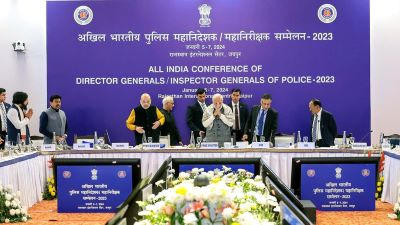Context:
The recent three-day conference in Jaipur brought together top police officers from across India, focusing on the contemporary challenges in law enforcement, particularly in the realm of Information Technology. The Prime Minister's presence underscored the growing importance of efficient policing in the country. However, despite the honest intentions of the executive, there remains a significant hurdle—the public's abysmal trust in the police force.
Public Trust and Image:
Even seven decades after India's independence, the police struggle to earn the trust and confidence of the majority. The public perception of the police force remains poor, deterring citizens from seeking help unless in extreme distress. This lack of trust persists despite various attempts at police reform, including the recommendations of the National Police Commission (NPC) in 1977, the Ribeiro Committee in 1998, and the guidelines laid out by the Supreme Court in the Prakash Singh case in 2006.
Reforms in the Past:
National Police Commission (NPC) - 1978-82:
● Comprehensive review of the national police system.
● Key recommendation: Amendment of the Code of Criminal Procedure 1973.
Ribero Committee - 1998:
● Formed on the Supreme Court's directive to review police reform progress.
● Aimed at implementing pending recommendations from the NPC.
Padmanabhaiah Committee - 2000:
● Presented report with 240 recommendations in August 2000.
● Accepted 154 recommendations.
Malimath Committee - 2002-03:
● Recommended 158 reforms, including the establishment of a central law enforcement agency.
Model Police Act - 2006:
● Focused on functional autonomy, professionalism, and accountability.
Current Legislative Developments:
● Three new criminal laws introduced in Parliament during the monsoon session.
● Aiming to replace IPC, CrPC, and Evidence Act enacted during British rule.
● Emphasized by the Union Home Minister for timely justice delivery.
Union Home Minister's Perspective:
● Urgency for updating laws unchanged since 1860.
● Expressed confidence in new laws expediting justice delivery.
Discord between Center and States:
Complicating matters is the growing discord between the Centre and some Opposition-led States regarding the Indian Police Service (IPS). States view the IPS as 'permanent irritants' and prefer recruits with local loyalties. This discord may escalate in the future, requiring delicate resolution to maintain harmonious federal governance.
Technology Advancement:
On a positive note, the police force has become more technology-savvy, potentially driven by an influx of educated recruits at the lower echelons. However, the question arises—will these recruits, often joining due to high unemployment rates, get a fair opportunity to showcase their talents, or will the spotlight continue to be dominated by IPS officers?
Structural Reforms for Quality Policing:
A major restructuring is essential to narrow the gap between higher and lower ranks within the police force. This change can pave the way for an improved quality of policing where knowledge, integrity, and genuine empathy coexist. For meaningful transformation, senior police officers must prioritize education and mentorship, fostering a culture of continuous learning among all ranks.
Political Interference:
One cannot discuss policing without addressing the perennial issue of political interference. The politicization of the police force remains a significant concern, complicating efforts to insulate law enforcement from political pressures. Achieving true independence and autonomy for the police force necessitates broader changes in the democratic system.
Some Measures for Reform are –
Here are some measures given below –
SMART Policing:
● The police force needs to be strict, sensitive, modern, mobile, alert, accountable, reliable, responsive, tech-savvy, and well-trained. Studies emphasize the positive impact of respectful and accountable policing on citizen compliance with the law.
Use of Body Cameras:
● Body-worn cameras can provide an objective record of police-citizen interactions, promoting accountability on both sides. The Prakash Singh guidelines advocate for the use of body cameras.
Oversight Committees:
● Independent civilian oversight committees should be established to evaluate police actions and ensure compliance with ethical and legal standards. These committees, comprising community leaders, play a crucial role in holding law enforcement accountable.
Training on Ethics and Education:
● Continuous training on ethical behavior, human rights, and community relations is essential to instill accountability within the police force. This training equips officers to respond appropriately and competently in diverse situations.
Police Complaints Authority:
● Independent authorities must be set up at the state and district levels to investigate complaints of police misconduct. The Model Police Act of 2006 recommends the establishment of such authorities consisting of retired high court judges, police officers, and public administrators.
Transparency:
● Transparency in decision-making is crucial for building public trust in police operations. Openness, ethical conduct, and citizen engagement contribute to informed advocacy for necessary changes in policing practices.
Community Engagement:
● Actively involving communities in policing efforts fosters trust, understanding, and local insight. Community engagement ensures that law enforcement strategies address community-specific issues effectively, promoting positive relationships between police personnel and citizens.
Legislative Changes:
● Past committees, such as the National Police Commission and the Padmanabhaiah Committee, have made important recommendations. Legislative changes, particularly those suggested by the Model Police Act of 2006, focus on functional autonomy, professionalism, and accountability within the police agency.
Conclusion:
Transforming policing in India is a complex task that requires a multi-faceted approach. While technological advancements and contemporary reforms show promise, addressing deep-rooted issues such as public trust, political interference, and hierarchical disparities is equally crucial. Policymakers, senior police officers, and the public must work together to implement comprehensive reforms that ensure a police force aligned with democratic values, accountability, and a genuine commitment to serving and protecting the citizens of India.
|
Probable Questions for UPSC Mains Exam
|
Source – The Hindu







